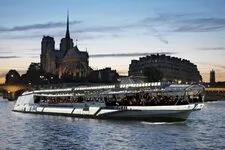History of the Bateaux-Mouches of Paris

The Origin of the Term "Bateau-Mouche"
The term "bateau-mouche" appeared in the 19th century... but not in Paris! It all began in Lyon, in the Mouche district, located on the banks of the Saône. In 1862, two entrepreneurs, Chaize and Plasson, built new vessels in their shipyards. These boats quickly became associated with their place of origin and took the name of bateaux-mouches.
Plasson then had the brilliant idea of offering his ships for the 1867 World Exposition in Paris. Thirty bateaux-mouches were transported to the capital and immediately captivated Parisians. They became a practical, fast, and inexpensive means of transportation, even adopted by celebrities of the time, such as Tsar Alexander III and his sons.
The first written mention of the bateaux-mouches dates back to 1887, by Paul Bert, who described these steam boats carrying 300 to 400 passengers "for their speed and the low price of tickets." Far from the romantic cruises we know today, the bateaux-mouches were then genuine public transport on the Seine.
Discover our various boat cruise outings!
The decline… then the rebirth
Starting in 1900, the opening of the Paris metro marked the decline of this popular navigation. The bateaux-mouches almost completely disappeared, until their rebirth after World War II.
It was Jean Bruel, a visionary and humorous entrepreneur, who revived the concept. In 1950, he founded the Company of Bateaux-Mouches de Paris, transformed the cruise on the Seine into a tourist attraction, and even invented an imaginary founder: Jean-Sébastien Mouche, presented as a collaborator of Baron Haussmann and creator of the "mouchards"! With this marketing genius, the myth was born.
Today: a must-see in Paris
Today, the riverboats are no longer just a means of transport, but an essential tourist experience. Whether you choose:
- A riverboat departing from the Eiffel Tower to enjoy breathtaking views,
- A dinner on a riverboat in Paris, romantic and refined,
- A lunch on a riverboat to discover the Seine in broad daylight,
- A night cruise on a riverboat, magical under the lights of the City,
- A cruise on the riverboats departing from the Alma Bridge, an iconic starting point,
- Or even a cheap riverboat for an accessible moment for everyone.
It is even possible to give a gift voucher for a riverboat in Paris or easily check the prices of riverboats in Paris.

















